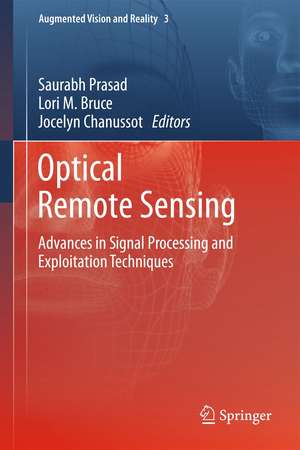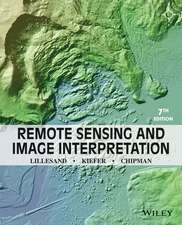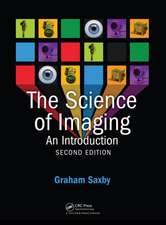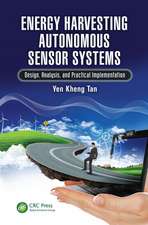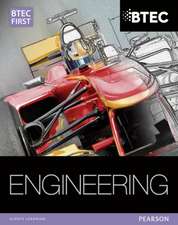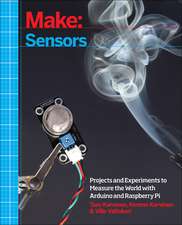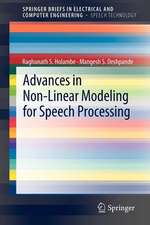Optical Remote Sensing: Advances in Signal Processing and Exploitation Techniques: Augmented Vision and Reality, cartea 3
Editat de Saurabh Prasad, Lori M. Bruce, Jocelyn Chanussoten Limba Engleză Paperback – 23 apr 2013
| Toate formatele și edițiile | Preț | Express |
|---|---|---|
| Paperback (1) | 947.35 lei 6-8 săpt. | |
| Springer Berlin, Heidelberg – 23 apr 2013 | 947.35 lei 6-8 săpt. | |
| Hardback (1) | 951.47 lei 6-8 săpt. | |
| Springer Berlin, Heidelberg – 23 mar 2011 | 951.47 lei 6-8 săpt. |
Preț: 947.35 lei
Preț vechi: 1155.30 lei
-18% Nou
Puncte Express: 1421
Preț estimativ în valută:
181.27€ • 189.77$ • 149.99£
181.27€ • 189.77$ • 149.99£
Carte tipărită la comandă
Livrare economică 05-19 aprilie
Preluare comenzi: 021 569.72.76
Specificații
ISBN-13: 9783642267475
ISBN-10: 3642267475
Pagini: 352
Ilustrații: VIII, 344 p.
Dimensiuni: 155 x 235 x 18 mm
Greutate: 0.5 kg
Ediția:2011
Editura: Springer Berlin, Heidelberg
Colecția Springer
Seria Augmented Vision and Reality
Locul publicării:Berlin, Heidelberg, Germany
ISBN-10: 3642267475
Pagini: 352
Ilustrații: VIII, 344 p.
Dimensiuni: 155 x 235 x 18 mm
Greutate: 0.5 kg
Ediția:2011
Editura: Springer Berlin, Heidelberg
Colecția Springer
Seria Augmented Vision and Reality
Locul publicării:Berlin, Heidelberg, Germany
Public țintă
ResearchCuprins
pre-processing images.- storing and representing high dimensional data.- fusing different sensor modalities.- pattern classification and target recognition.- visualization of high dimensional imagery.
Recenzii
From the reviews:
“This book is composed of contributions that address many of the contemporary problems faced when processing hyperspectral image data. As expected, there are chapters focussed on thematic mapping and classification, spectral un-mixing, morphology and compression … . important to anyone interested in the state of kernel based methods in image analysis. … It is very well written, makes very good use of examples and will be an important reference work for those working on un-mixing problems.” (John Richards, IEEE Geoscience and Remote Sensing Society Newsletter, June, 2011)
“This excellent reference focuses on advances in signal processing and exploitation techniques for optical remote sensing with a collection of state-of-the art algorithms for hyperspectral and multispectral imaging technologies. It is intended for advanced users, particularly graduate students and image scientists specializing in the field of optical remote sensing. … This cutting-edge publication includes a collection of images and graphics, processing technologies and parallel implementations with up-to-date references at the end of each chapter.” (Axel Mainzer Koenig, Optics & Photonics News, July, 2012)
“This book is composed of contributions that address many of the contemporary problems faced when processing hyperspectral image data. As expected, there are chapters focussed on thematic mapping and classification, spectral un-mixing, morphology and compression … . important to anyone interested in the state of kernel based methods in image analysis. … It is very well written, makes very good use of examples and will be an important reference work for those working on un-mixing problems.” (John Richards, IEEE Geoscience and Remote Sensing Society Newsletter, June, 2011)
“This excellent reference focuses on advances in signal processing and exploitation techniques for optical remote sensing with a collection of state-of-the art algorithms for hyperspectral and multispectral imaging technologies. It is intended for advanced users, particularly graduate students and image scientists specializing in the field of optical remote sensing. … This cutting-edge publication includes a collection of images and graphics, processing technologies and parallel implementations with up-to-date references at the end of each chapter.” (Axel Mainzer Koenig, Optics & Photonics News, July, 2012)
Textul de pe ultima copertă
Optical remote sensing involves acquisition and analysis of optical data – electromagnetic radiation captured by the sensing modality after reflecting off an area of interest on ground. Optical image acquisition modalities have come a long way – from gray-scale photogrammetric images to hyperspectral images. The advances in imaging hardware over recent decades have enabled availability of high spatial, spectral and temporal resolution imagery to the remote sensing analyst. These advances have created unique challenges for researchers in the remote sensing community working on algorithms for representation, exploitation and analysis of such data.
Early optical remote sensing systems relied on multispectral sensors, which are characterized by a small number of wide spectral bands. Although multispectral sensors are still employed by analysts, in recent years, the remote sensing community has seen a steady shift to hyperspectral sensors, which are characterized by hundreds of fine resolution co-registered spectral bands, as the dominant optical sensing technology. Such data has the potential to reveal the underlying phenomenology as described by spectral characteristics accurately. This “extension” from multispectral to hyperspectral imaging does not imply that the signal processing and exploitation techniques can be simply scaled up to accommodate the extra dimensions in the data. This book presents state-of-the-art signal processing and exploitation algorithms that address three key challenges within the context of modern optical remote sensing: (1) Representation and visualization of high dimensional data for efficient and reliable transmission, storage and interpretation; (2) Statistical pattern classification for robust land-cover-classification, target recognition and pixel unmixing; (3) Fusion of multi-sensor data to effectively exploit multiple sources of information for analysis.
Early optical remote sensing systems relied on multispectral sensors, which are characterized by a small number of wide spectral bands. Although multispectral sensors are still employed by analysts, in recent years, the remote sensing community has seen a steady shift to hyperspectral sensors, which are characterized by hundreds of fine resolution co-registered spectral bands, as the dominant optical sensing technology. Such data has the potential to reveal the underlying phenomenology as described by spectral characteristics accurately. This “extension” from multispectral to hyperspectral imaging does not imply that the signal processing and exploitation techniques can be simply scaled up to accommodate the extra dimensions in the data. This book presents state-of-the-art signal processing and exploitation algorithms that address three key challenges within the context of modern optical remote sensing: (1) Representation and visualization of high dimensional data for efficient and reliable transmission, storage and interpretation; (2) Statistical pattern classification for robust land-cover-classification, target recognition and pixel unmixing; (3) Fusion of multi-sensor data to effectively exploit multiple sources of information for analysis.
Caracteristici
Presents current state-of-the-art algorithms Addresses key challenges for an effective exploitation Written by key scientists in the field Includes supplementary material: sn.pub/extras
